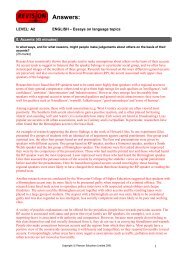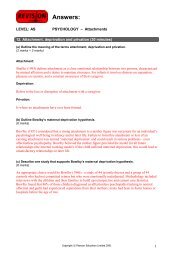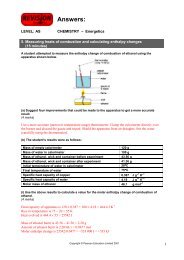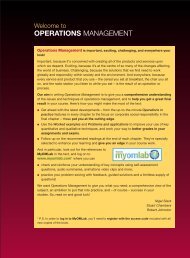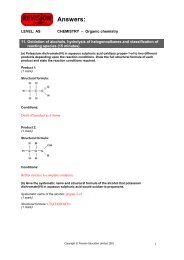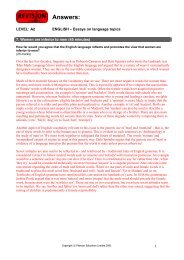The Dove Campaign for Real Beauty - Pearson
The Dove Campaign for Real Beauty - Pearson
The Dove Campaign for Real Beauty - Pearson
You also want an ePaper? Increase the reach of your titles
YUMPU automatically turns print PDFs into web optimized ePapers that Google loves.
Chapter 2 Sustainable marketing: marketing ethics and social responsibilityMeanwhile Alasdair MacIntyre looks back to the Aristotelian idea that weshould concentrate less on the individual and more on people and what is good<strong>for</strong> society.…2.2SOURCES: J. Ackrill, Aristotle and the Philosophers (Ox<strong>for</strong>d, 1981); G. Kerner, Three Philosophical Moralists(Ox<strong>for</strong>d, 1990); A. MacIntyre, A Short History of Ethics (Routledge, 1987); D. Robinson and C. Garratt, Ethics <strong>for</strong>Beginners (Icon, 1996); B. Russell, A History of Western Philosophy (Ox<strong>for</strong>d, 1945); P. Singer, Practical Ethics(Ox<strong>for</strong>d, 1993); Lynn Sharp Paine, Value Shift (McGraw-Hill, 2003).Although bribes and kickbacks are illegal in many countries, they are standard business practicein many others. One recent study found that companies from some nations were much morelikely to use bribes when seeking contracts in emerging-market nations. <strong>The</strong> most flagrant bribepayingfirms were from Russia and China, with Taiwan and South Korea close behind. Othercountries where corruption is common include Turkmenistan, Bangladesh and Chad. <strong>The</strong> leastcorrupt were companies from Iceland, Finland, New Zealand and Denmark. 42“Although bribes and kickbacks are illegal in many countries, they are standardbusiness practice in many others.Across the globe, national cultures naturally impose different standards of behaviour onindividuals and organisations. In the EU, each market sector in each country is still characterisedby a mixture of accepted commercial practices, codes of practice and <strong>for</strong>malised legislation. Whatis considered an acceptable practice in one country may be illegal in another. Although the EUseeks to move towards a pan-European business ethics policy and codes of conduct, that day isstill some way off.<strong>The</strong> question arises as to whether a company must lower its ethical standards to competeeffectively in countries with lower standards. <strong>The</strong> answer: no. For the sake of all the company’sstakeholders – customers, suppliers, employees, shareholders and the public – it is important tomake a commitment to a common set of standards worldwide. For example, the ethical code ofjeans manufacturer Levi Strauss <strong>for</strong>bids bribes, whether or not prevalent or legal in the <strong>for</strong>eigncountry involved.Many industrial and professional associations have suggested codes of ethics and many companiesare now adopting their own codes. Ef<strong>for</strong>ts have also been made to develop ‘global’ standards.“An example is the Social Accountability standard SA8000, an international certificationstandard that encourages organisations to develop, maintain and apply socially acceptablepractices in the workplace. It was created in 1989 by Social Accountability International (SAI), anaffiliate of the Council on Economic Priorities, and is viewed as the most globally acceptableindependent workplace standard. It can be applied to any company, of any size, in any part of theworld. <strong>The</strong> areas it addresses include <strong>for</strong>ced and child labour, health and safety, freedom ofassociation and collective bargaining, discrimination, disciplinary practices, working hours,compensation and management systems. 43107



